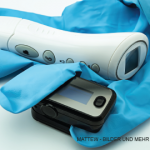PHILADELPHIA—Research on the mechanisms of systemic autoinflammatory diseases is providing important information on the genetic control of inflammation and driving interest in the development of new targeted therapies for rheumatic diseases.
Daniel L. Kastner, MD, PhD, clinical director at the National Institute of Arthritis and Musculoskeletal and Skin Diseases (NIAMS) at the National Institutes of Health in Bethesda, Md., noted the continuum between autoinflammatory and autoimmune diseases.
Speaking here at the ACR/ARHP Annual Scientific Meeting, Dr. Kastner said the systemic inflammatory diseases are characterized by episodes of seemingly unprovoked infection and the absence of high-titer autoantibodies or antigen-specific autoreactive T cells. The Mendelian autoinflammatory diseases “turn out to be inborn errors of the innate immune system,” Dr. Kastner said during the ACR’s basic research conference on the genetics of rheumatic diseases.
“The challenges that face us in the next several years will be further elucidation of the Mendelian autoinflammatory diseases, looking for a few genes and elucidating the susceptibility they confer on increased risk,” he said.
Dr. Kastner’s laboratory played a key role in the discovery of the gene for familial Mediterranean fever (FMF), one of the most common of the periodic fever syndromes. The variation in this gene is indicative of “ancient ancestral mutations,” he noted. An autosomal recessive disorder, FMF is marked by fever lasting about three days, abdominal pain, and elevation in peripheral white blood cell count. Fluid from the inflamed joints can exhibit leukocytosis with a predominance of neutrophils.
Dr. Kastner listed several challenges facing researchers in the field of autoinflammatory diseases: elucidating the immunobiology, adopting a pathophysiological rather than clinical classification of the diseases, developing animal models, and moving forward with development of targeted therapy.
TRAPS: Mutations in TNFR1
Richard M. Siegel, MD, PhD, principal investigator in the Autoimmunity Branch at NIAMS, outlined what is known about TRAPS, or tumor necrosis factor receptor–associated periodic syndrome, an autoinflammatory disease classified as one of the hereditary periodic fever syndromes. TRAPS is “a quite rare … Mendelian disease, one of nature’s experiments,” with dominant mutations in TNF receptor 1 (TNFR1), Dr. Siegel said.
Like other autoinflammatory diseases, TRAPS manifests as periodic episodes of fever, abdominal pain, conjunctivitis, and a migratory rash. Some flare-ups can extend beyond five days, and little is known about what triggers the flare-ups. Initially called familial Hibernian fever, TRAPS can present in infancy and even into adulthood and is not accompanied by any viral or bacterial infection. Amyloidosis can be a life-threatening complication, Dr. Siegel said.

